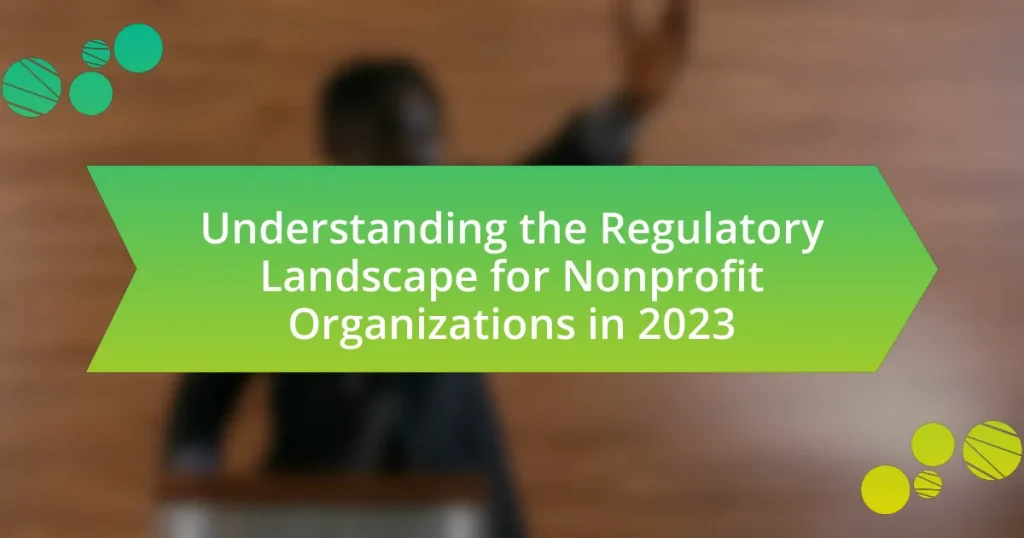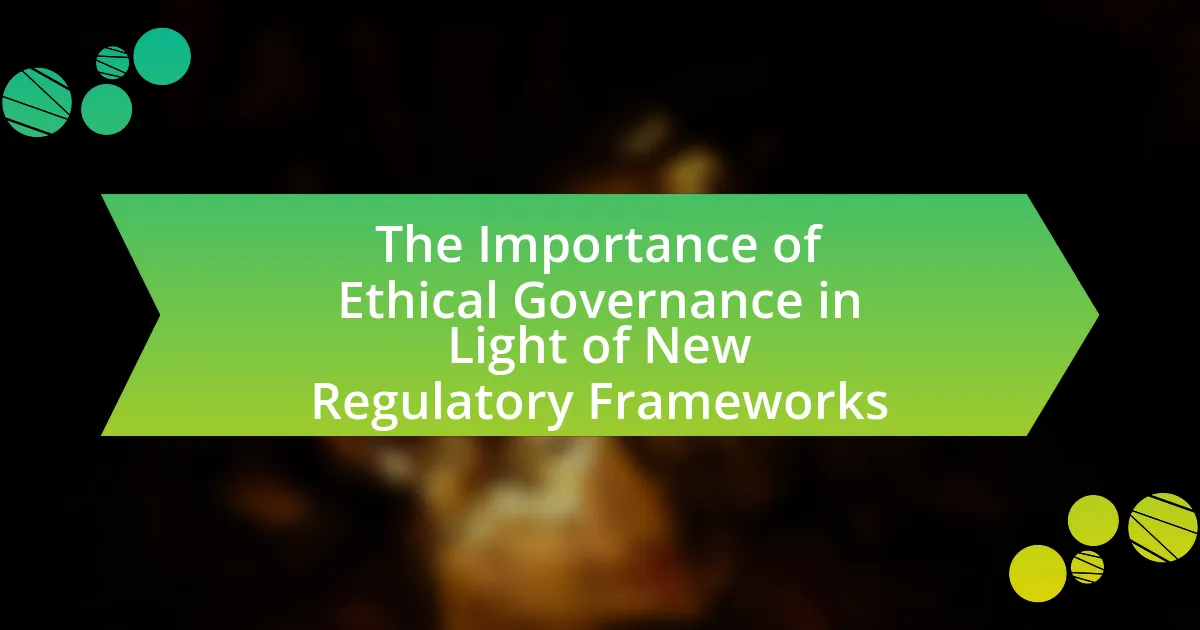The article focuses on the regulatory landscape for nonprofit organizations in 2023, highlighting the increased scrutiny and evolving compliance requirements that these entities face. It outlines the impact of regulations on nonprofit operations, including the necessity for transparency, accountability, and adherence to federal and state laws. Key regulatory bodies, such as the IRS and state charity regulators, are discussed, along with the variations in regulations across different regions. The article also addresses the importance of understanding compliance to mitigate risks, enhance credibility, and adapt to recent legislative changes affecting fundraising and tax-exempt status. Best practices for maintaining compliance and leveraging technology are emphasized as essential strategies for nonprofits in navigating the complex regulatory environment.
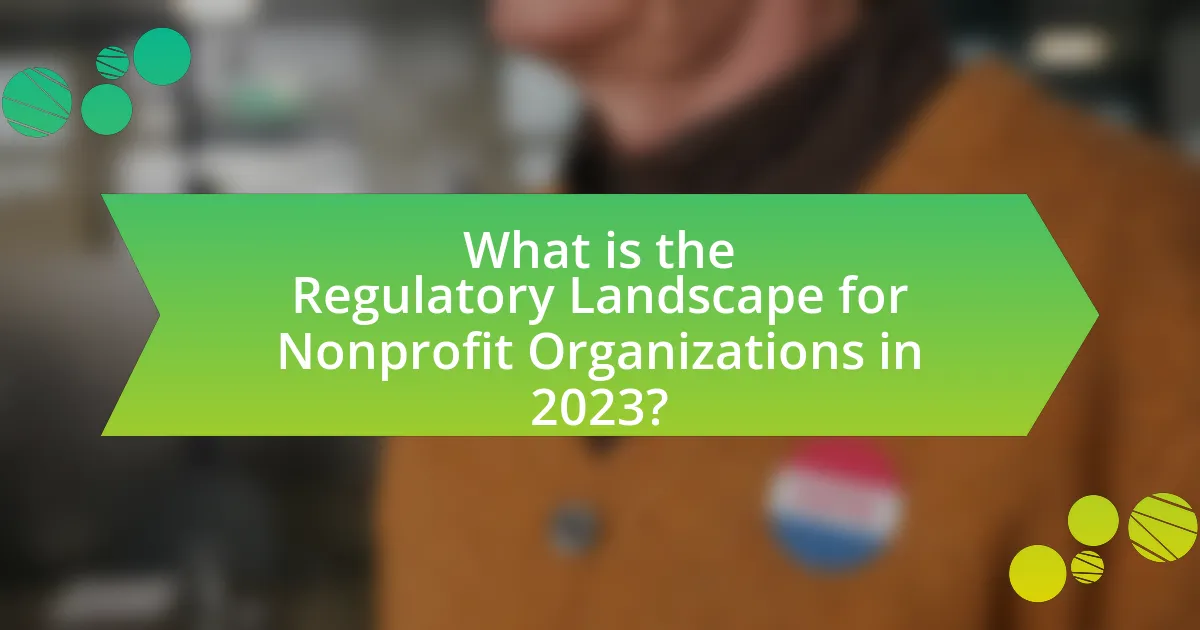
What is the Regulatory Landscape for Nonprofit Organizations in 2023?
The regulatory landscape for nonprofit organizations in 2023 is characterized by increased scrutiny and evolving compliance requirements. Nonprofits must navigate a complex framework that includes federal, state, and local regulations, with particular emphasis on transparency, accountability, and governance. For instance, the IRS continues to enforce strict guidelines regarding tax-exempt status, requiring nonprofits to file Form 990 annually, which discloses financial information and operational activities. Additionally, many states have implemented stricter fundraising regulations, necessitating registration and reporting for charitable solicitations. This heightened regulatory environment aims to enhance public trust and ensure that nonprofit organizations operate effectively and ethically.
How do regulations impact nonprofit organizations?
Regulations significantly impact nonprofit organizations by dictating their operational frameworks, compliance requirements, and funding eligibility. These regulations, which include tax laws, reporting obligations, and governance standards, shape how nonprofits manage their resources and engage with stakeholders. For instance, the Internal Revenue Service (IRS) mandates that 501(c)(3) organizations adhere to specific guidelines to maintain their tax-exempt status, including restrictions on political activities and requirements for financial transparency. Failure to comply with these regulations can result in penalties, loss of tax-exempt status, or legal repercussions, thereby affecting the organization’s sustainability and public trust.
What are the key regulatory bodies overseeing nonprofits?
The key regulatory bodies overseeing nonprofits include the Internal Revenue Service (IRS) in the United States, which regulates tax-exempt status, and state charity regulators, which enforce state-specific laws governing charitable organizations. The IRS ensures compliance with federal tax laws, while state regulators oversee registration, fundraising practices, and financial reporting for nonprofits operating within their jurisdictions. These bodies collectively ensure that nonprofits adhere to legal standards and maintain transparency in their operations.
How do regulations vary by state or region?
Regulations for nonprofit organizations vary significantly by state or region, reflecting local laws and governance structures. For instance, some states require nonprofits to register with the state attorney general, while others may not have such a requirement. Additionally, tax-exempt status can differ; states like California impose specific requirements for charitable organizations, including annual reporting, whereas states like Wyoming have fewer regulations. These variations can impact operational compliance, fundraising practices, and reporting obligations, making it essential for nonprofits to understand the specific regulations applicable in their jurisdiction.
Why is understanding regulations important for nonprofits?
Understanding regulations is crucial for nonprofits because it ensures compliance with legal requirements, which helps avoid penalties and maintains the organization’s tax-exempt status. Nonprofits operate under specific laws that govern fundraising, financial reporting, and governance, and failure to adhere to these regulations can lead to legal repercussions, loss of funding, or damage to reputation. For instance, the IRS requires nonprofits to file Form 990 annually, and noncompliance can result in fines or revocation of tax-exempt status. Therefore, a thorough understanding of regulations is essential for effective management and sustainability of nonprofit organizations.
What risks do nonprofits face without compliance?
Nonprofits face significant risks without compliance, including legal penalties, loss of tax-exempt status, and reputational damage. Legal penalties can arise from failing to adhere to federal and state regulations, which may result in fines or lawsuits. The loss of tax-exempt status occurs when a nonprofit does not meet the requirements set by the IRS, leading to taxation on income and potential back taxes owed. Reputational damage can severely impact fundraising efforts and community trust, as stakeholders may view noncompliance as a lack of accountability or integrity. According to the National Council of Nonprofits, over 30% of nonprofits have faced compliance-related issues, highlighting the importance of adhering to regulations to mitigate these risks.
How can compliance enhance a nonprofit’s credibility?
Compliance enhances a nonprofit’s credibility by demonstrating adherence to legal and ethical standards, which fosters trust among stakeholders. When a nonprofit complies with regulations, it signals to donors, beneficiaries, and the public that it operates transparently and responsibly. For instance, organizations that follow the IRS guidelines for tax-exempt status not only avoid legal penalties but also gain legitimacy in the eyes of potential supporters. Research indicates that nonprofits with strong compliance records are more likely to receive funding, as 75% of donors consider compliance a critical factor in their giving decisions.
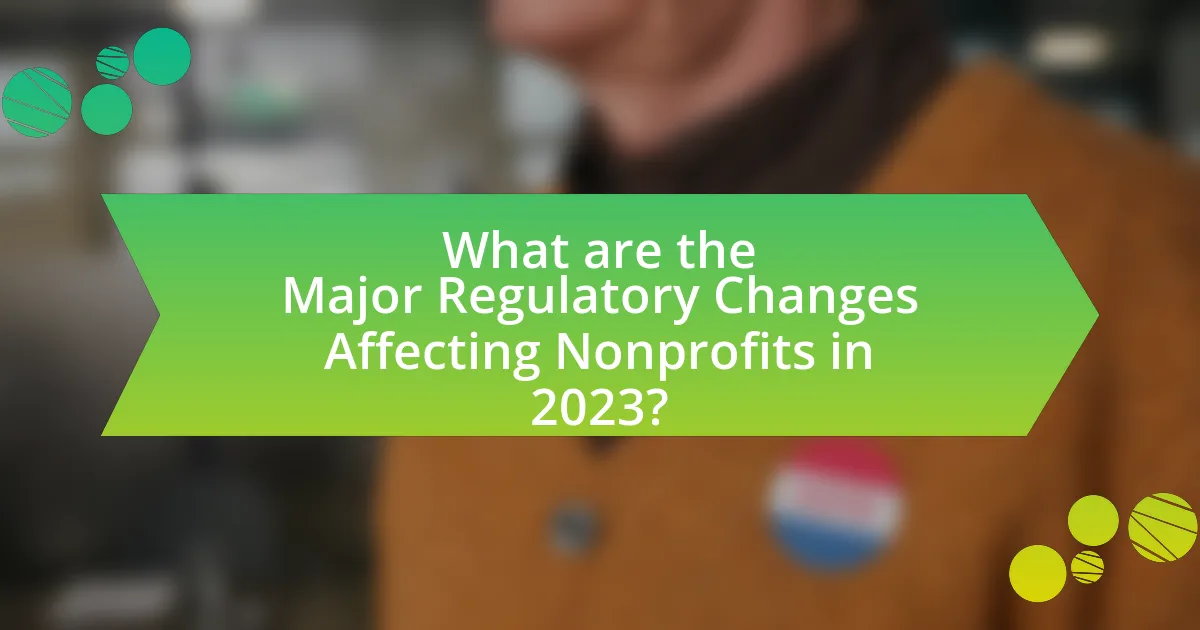
What are the Major Regulatory Changes Affecting Nonprofits in 2023?
In 2023, major regulatory changes affecting nonprofits include the implementation of new transparency requirements and updates to tax-exempt status regulations. The IRS has introduced stricter guidelines for financial disclosures, mandating that nonprofits provide more detailed information about their funding sources and expenditures. Additionally, several states have enacted laws requiring nonprofits to disclose their executive compensation packages, aiming to enhance accountability. These changes are designed to improve public trust and ensure that nonprofit organizations operate with greater transparency and integrity.
What new laws have been enacted for nonprofits this year?
As of 2023, several new laws have been enacted for nonprofits, including the Charitable Act, which enhances tax deductions for charitable contributions, and the Nonprofit Transparency and Accountability Act, aimed at increasing financial reporting requirements for nonprofit organizations. The Charitable Act allows individuals to deduct up to 100% of their adjusted gross income for charitable donations, a significant increase from previous limits, thereby incentivizing more contributions to nonprofits. The Nonprofit Transparency and Accountability Act mandates that nonprofits with annual revenues exceeding $1 million must provide detailed financial statements and undergo independent audits, promoting greater accountability and transparency in the sector. These legislative changes reflect a growing emphasis on supporting nonprofit organizations while ensuring they operate with integrity and transparency.
How do these laws affect fundraising activities?
Laws significantly impact fundraising activities by establishing regulations that nonprofits must follow to ensure compliance and transparency. For instance, laws governing charitable solicitations require organizations to register in each state where they solicit donations, which can limit their ability to raise funds across state lines. Additionally, tax laws dictate the deductibility of donations, influencing donor willingness to contribute. According to the National Council of Nonprofits, compliance with these laws can incur administrative costs and necessitate legal guidance, which may divert resources away from fundraising efforts.
What changes have been made to tax-exempt status requirements?
Changes to tax-exempt status requirements include stricter compliance measures and enhanced reporting obligations for nonprofit organizations. The IRS has implemented these changes to ensure greater transparency and accountability, particularly focusing on organizations’ activities and financial practices. For instance, the IRS now requires more detailed disclosures regarding fundraising activities and the use of funds, which aims to prevent misuse of tax-exempt status. These adjustments reflect ongoing efforts to maintain the integrity of the nonprofit sector and ensure that organizations adhere to their stated missions.
How are nonprofits adapting to these regulatory changes?
Nonprofits are adapting to regulatory changes by enhancing compliance measures and increasing transparency in their operations. Many organizations are implementing new governance structures to align with updated laws, such as adopting stricter financial reporting practices and improving internal controls. For instance, the IRS has introduced new requirements for Form 990, prompting nonprofits to invest in training for staff and board members to ensure accurate reporting. Additionally, nonprofits are leveraging technology to streamline compliance processes, such as using software for tracking donations and expenditures, which helps maintain accountability and meet regulatory standards.
What strategies are nonprofits using to ensure compliance?
Nonprofits are employing several strategies to ensure compliance with regulatory requirements. These strategies include implementing robust internal controls, conducting regular training for staff on compliance issues, and utilizing compliance management software to track regulations and reporting deadlines. For instance, a study by the National Council of Nonprofits highlights that organizations that establish clear policies and procedures are better equipped to navigate complex regulations, thereby reducing the risk of noncompliance. Additionally, many nonprofits engage legal counsel to review their practices and ensure adherence to federal and state laws, further solidifying their compliance efforts.
How can nonprofits leverage technology to meet regulatory demands?
Nonprofits can leverage technology to meet regulatory demands by implementing compliance management software that automates tracking and reporting processes. This technology enables organizations to efficiently manage documentation, deadlines, and regulatory changes, ensuring adherence to laws such as the IRS regulations for tax-exempt status. For instance, using platforms like Salesforce or QuickBooks can streamline financial reporting and donor management, which are critical for compliance. According to a 2021 report by the National Council of Nonprofits, 70% of nonprofits that adopted technology for compliance saw improved accuracy in their reporting, demonstrating the effectiveness of these tools in meeting regulatory requirements.
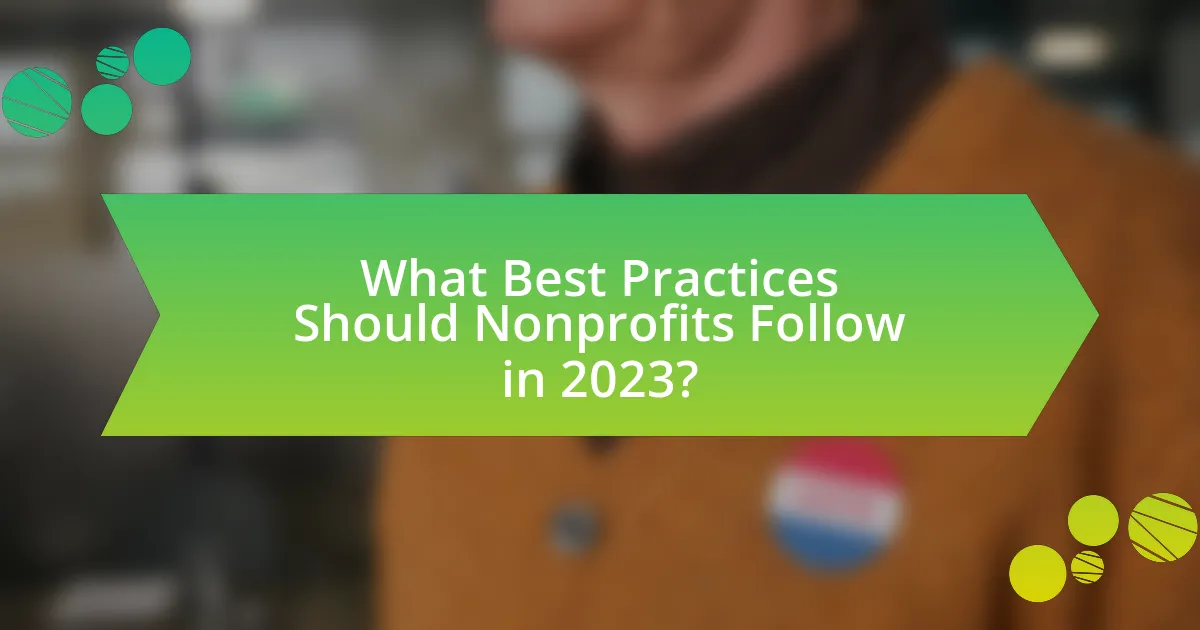
What Best Practices Should Nonprofits Follow in 2023?
Nonprofits in 2023 should prioritize transparency, compliance with regulations, and effective communication. Transparency involves openly sharing financial information and program outcomes, which builds trust with stakeholders. Compliance with federal and state regulations, such as maintaining tax-exempt status and adhering to fundraising laws, is crucial to avoid legal issues. Effective communication includes engaging with donors and the community through social media and newsletters, which enhances visibility and support. According to the National Council of Nonprofits, organizations that implement these best practices are more likely to sustain funding and achieve their missions successfully.
What are the essential compliance practices for nonprofits?
Essential compliance practices for nonprofits include maintaining accurate financial records, adhering to tax regulations, and ensuring proper governance. Nonprofits must file annual returns, such as Form 990 in the United States, to report their financial activities and maintain tax-exempt status. Additionally, they should implement conflict of interest policies and conduct regular board meetings to ensure transparency and accountability. According to the IRS, failure to comply with these practices can result in penalties or loss of tax-exempt status, highlighting the importance of adherence to regulatory requirements.
How can nonprofits maintain accurate financial records?
Nonprofits can maintain accurate financial records by implementing a robust accounting system that includes regular reconciliations, detailed documentation of transactions, and adherence to accounting standards. Utilizing accounting software designed for nonprofits can streamline the process, ensuring that all income and expenses are tracked systematically. Regular audits and reviews by external professionals can further validate the accuracy of financial records, as evidenced by the fact that organizations that conduct annual audits report fewer discrepancies and improved financial management. Additionally, training staff on financial policies and procedures enhances compliance and accuracy in record-keeping.
What role does transparency play in compliance?
Transparency is essential in compliance as it fosters trust and accountability within organizations. By openly sharing information regarding operations, financials, and decision-making processes, organizations demonstrate their commitment to ethical practices and regulatory adherence. For instance, the IRS requires nonprofit organizations to disclose their Form 990, which provides detailed financial information, thereby promoting transparency and enabling stakeholders to assess compliance with tax regulations. This openness not only mitigates risks of non-compliance but also enhances the organization’s reputation and encourages stakeholder engagement.
How can nonprofits stay informed about regulatory updates?
Nonprofits can stay informed about regulatory updates by subscribing to newsletters from relevant regulatory bodies and industry associations. These organizations, such as the IRS and state charity regulators, often provide timely updates on changes in laws and regulations affecting nonprofits. Additionally, attending webinars and conferences focused on nonprofit management can offer insights into regulatory changes. Research indicates that 70% of nonprofits rely on these resources to remain compliant and informed about the evolving regulatory landscape.
What resources are available for tracking nonprofit regulations?
The primary resources available for tracking nonprofit regulations include the National Council of Nonprofits, state charity regulators, and the IRS website. The National Council of Nonprofits provides comprehensive guidance on federal and state regulations affecting nonprofits, while state charity regulators offer specific information relevant to each state’s laws. The IRS website is crucial for understanding federal tax regulations and compliance requirements for nonprofit organizations. These resources collectively ensure that nonprofits stay informed about the evolving regulatory landscape.
How can networking with other nonprofits aid in compliance efforts?
Networking with other nonprofits can significantly enhance compliance efforts by facilitating the sharing of best practices and resources. When organizations collaborate, they can exchange information about regulatory requirements, compliance strategies, and successful audits, which helps to ensure adherence to laws and regulations. For instance, a study by the National Council of Nonprofits highlights that nonprofits engaged in collaborative networks are better equipped to navigate complex compliance landscapes, as they benefit from collective knowledge and experiences. This shared understanding can lead to improved risk management and more effective implementation of compliance measures across the sector.
What practical steps can nonprofits take to ensure compliance?
Nonprofits can ensure compliance by implementing a robust compliance program that includes regular training, policy development, and monitoring. Establishing clear policies and procedures tailored to specific regulations, such as IRS guidelines for tax-exempt status, is essential. Regular training sessions for staff and board members on compliance issues, including financial reporting and ethical standards, help maintain awareness and adherence to regulations. Additionally, nonprofits should conduct periodic audits to assess compliance with federal, state, and local laws, ensuring that any discrepancies are addressed promptly. Engaging legal counsel familiar with nonprofit regulations can further enhance compliance efforts by providing expert guidance on evolving legal requirements.
